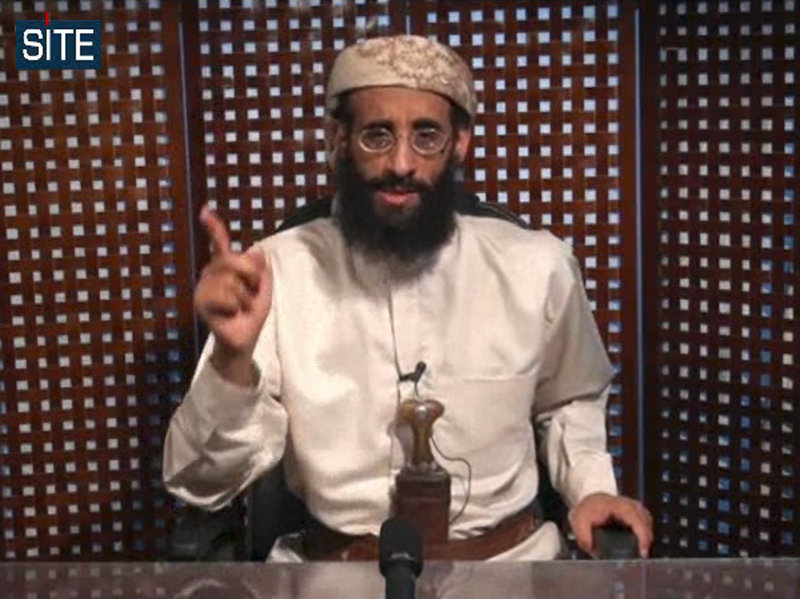The families of three U.S. citizens killed in drone strikes in Yemen last year, including militant cleric Anwar al-Awlaki, filed a lawsuit Wednesday that accuses top CIA and U.S. military officials of violating the constitutional rights of those killed.
The lawsuit, which was prepared in part by the American Civil Liberties Union, represents the most direct legal challenge yet to Barack Obama administration’s decision to kill U.S. citizens in counterterrorism operations without open due process or scrutiny from courts.
“These killings rely on vague legal standards, a closed executive process, and evidence never presented to the courts,” the suit alleges.
The suit stems from two drone strikes that took place over a six-week stretch last fall. The first, in September, killed Awlaki and alleged al-Qaida propagandist Samir Khan. The second strike, in October, killed Awlaki’s 16-year-old son. All three were born in the United States.
Jameel Jaffer, deputy legal director of the ACLU, said the suit seeks compensation for the families, but is primarily aimed at forcing the Obama administration to disclose details about decisions that were made in secret.
“It’s an effort to get accountability,” Jaffer said.
The administration has argued that requiring a court order in advance of strikes would cause delays and make the country more vulnerable to terrorist attack. Jaffer said the ACLU is “asking the government now, after the fact, to explain to a court why it did what it did.”
The defendants named in the suit include Defense Secretary Leon E. Panetta, CIA Director David H. Petraeus and two of the top officers in the U.S. military Special Operations ranks: Navy Adm. William H. McRaven and Army Gen. Joseph Votel.
Spokesmen for the CIA and Pentagon declined to comment on the suit, which was filed in U.S. District Court in the District of Columbia. The plaintiffs listed include Nasser al-Awlaki, the father of the cleric, and Sarah Khan, mother of Samir.
Obama administration officials have defended the drone campaign in recent speeches, but they have generally refused to discuss legal positions or criteria for operations in substantial detail.
In March, Attorney General Eric H. Holder Jr. said that “it may not always be feasible to capture a United States citizen terrorist who presents an imminent threat of violent attack. In that case, our government has the clear authority to defend the United States with lethal force.”
The suit, which was also prepared in part by the Center for Constitutional Rights, argues that none of the three U.S. citizens killed met the standard and that the government failed to exhaust opportunities to apprehend the men without resorting to lethal force.
“Some officials have suggested that the U.S. government targets its citizens only if they present ‘imminent’ threats,” the suit says, “but they have defined the term ‘imminent’ so broadly as to negate its meaning.”
U.S. officials have said that Awlaki, a native of New Mexico, was directly tied to several terrorist plots against the United States, including a Nigerian man’s failed attempt to detonate a bomb aboard a Detroit-bound plane on Christmas Day 2009.
Awlaki subsequently became the first U.S. citizen to be placed on the CIA’s drone target list, and he was on a separate “kill list” maintained by the military’s Joint Special Operations Command. An effort by Awlaki’s father to challenge the decision to place the cleric on those lists was dismissed by a federal court in 2010.
Copy the Story Link
Send questions/comments to the editors.



Success. Please wait for the page to reload. If the page does not reload within 5 seconds, please refresh the page.
Enter your email and password to access comments.
Hi, to comment on stories you must . This profile is in addition to your subscription and website login.
Already have a commenting profile? .
Invalid username/password.
Please check your email to confirm and complete your registration.
Only subscribers are eligible to post comments. Please subscribe or login first for digital access. Here’s why.
Use the form below to reset your password. When you've submitted your account email, we will send an email with a reset code.